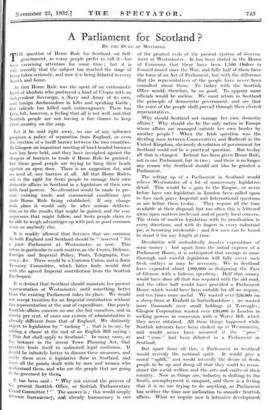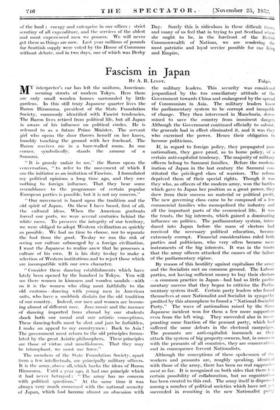A Parliament for Scotland ?
By TIIE DUKE OF MONTROSE.
THE question of Home Rule for Scotland—or Self- government, as many people prefer to call it—has been exercising attention for some time ; but it is only recently that the subject has reached the stage of being taken seriously, and now it is being debated in every hearth and home.
At first Home Rule was the sport of an enthusiastic band of idealists who portrayed a kind of Utopia with an independent Sovereign, a Navy and Army of its own, and foreign Ambassadors in kilts and speaking Gaelic ; but ridicule has killed such extravagances. There has been left, however, a feeling that all is not well, and that Scottish people are not having a fair chance to keep their country on the map.
Let it be said right away, no one of any influence proposes a policy of separation from England, or even the erection of a tariff barrier between the two countries. In Glasgow an important meeting of hard-headed business men has been held, and they have inveighed against the dangers of barriers to trade if Home Rule be granted ; but these good people are trying to bang their heads against an open door. There is no suggestion for, and no need of, any barriers at all. All that Home Rulers ask is the right for Scots people to manage their own domestic affairs in Scotland in a legislature of their own with final powers. No alteration would be made to pre- sent existing trade and commercial conditions ipso facto Home Rule being established. If any change took place it would only be after serious delibera- tion as to the results that might be gained, and the con- sequences that might follow, and Scots people claim to be able to weigh advantages up with just as good common sense as anybody else.
It is readily allowed that Services that are common to both England and Scotland should be "reserved " for a joint Parliament st Westminster as now. This refers in particular to such matters as the Crown, Defence, Foreign and Imperial Policy, Posts, Telegraphs, Cur- rency, &c. There would be a Customs Union, and a Joint Treasury Committee, which latter body would deal with the agreed Imperial contribution from the Scottish Exchequer.
It is desired that Scotland should maintain her present representation at Westminster, until something better than the existing Parliament takes its place. We would not accept taxation for an Imperial contribution without fair representation at the seat of expenditure. Our purely Scottish affairs concern no one else but ourselves, and in ninety per cent, of cases our system of administration is already different from that of England. We distinctly object to legislation by " tacking " ; that is to say, by adding a clause at the end of an English Bill saying : "This Act shall apply to Scotland." In many cases, as for instance in the recent Town Planning Act, that Practice lends itself to unlimited legal confusion. It would be infinitely better to discuss these measures, and settle them over a legislative floor in Scotland, and have all the points dealt with by men and women who understand them, and who are the people that are going to be governed by them.
It has been said : Why not extend the powers of the present Scottish Office, or Scottish Parliamentary Grand Committee ? " The answer is ; this would simply increase bureaucracy, and already bureaucracy is one of the greatest evils of the present system of Govern.. ment at Westminster. It has been stated in the House of Commons that there have been 1,500 Orders in Council issued since the War, and fully half of them have the force of an Act of Parliament, but with the difference that the representatives of the people have never been consulted about them. To tinker with the Scottish Office would, therefore, be no good. To appoint more officials would be useless. We must retain in Scotland the principle of democratic government, and see' that the voice of the people shall prevail through their elected representatives.
Why should Scotland not manage her own domestic affairs ? Why should she be the only nation in Europe whose affairs are managed outside her own border by another people ? When the Irish ' question was the dividing issue between Conservatives and Radicals in the United Kingdom, obviously devolution of government for Scotland could not be a practical question. But to-day all that is changed. Ireland has been given Home Rule, not in one Parliament, but in two ; and there is no longer any reason why Scotland should not also be granted a Parliament.
The setting up of a Parliament in Scotland would relieve Westminster of a lot of unnecessary legislative detail. This would be a gain to the Empire, as never before have our legislators in London been called upon to face such grave Imperial and International questions as are before them to-day. They require all the time available at their disposal, but too often this is frittered away upon matters irrelevant and of purely local concern. The strain of modern legislation with its ramification in every directions, and with its fingers in every industrial pie, is becoming intolerable ; and few men can be found to stand it for any length of time.
Devolution will undoubtedly involve expenditure of some money ; but apart from the initial expense of a Parliament House, it is anticipated that savings in more thorough and careful legislation will fully cover such fresh outlays as may be necessary. We in Scotland have expended about £900,000 in disfiguring the Pass of Glencoe with a hideous speedway. Half that money would have done all that was required with the old road, and the other half would have provided a Parliament House which would have been suitable for all we require, and ten times more useful. We wasted over 120,000 on a sheep farm at Erriboll in Sutherlandshire ; we wasted more thousands over small holdings at Terreaglcs ; Glasgow Corporation wasted over 00,000 in London in seeking powers in connexion with a Water Bill, which they never obtained. Al! these things happened while Scottish interests have been choked up at Westminster, and would never have occurred if the " pros " and " cons " had been debated in a Parliament in Scotland.
But apart from all this, a Parliament in Scotland would revivify the national spirit. It would give a moral "uplift," and would intensify the desire of Scots people to be up and doing all that they could to recon- struct the social welfare and the arts and crafts of their country. Now as things are, industry is drifting to the South, unemployment is rampant, and there is a feeling that it is no use trying to do anything, as Parliament has neither the time nor inclination to consider Scottish affairs. What we require now is intensive development of the land ; energy and enterprise in our offices ; strict scrutiny of all expenditure, and the services of the ablest and most experienced men we possess. We will never get these as things are now. Last year millions of pounds for Scottish supply were voted by the House of Commons without debate, and in two days, one of which was Derby Day. Surely this is ridiculous in these difficult times, and many of us feel that in trying to put Scotland where she ought to be, in the forefront, of the British Commonwealth of Nations, we are rendering the most patriotic and loyal service possible for our Ring and Empire.







































 Previous page
Previous page